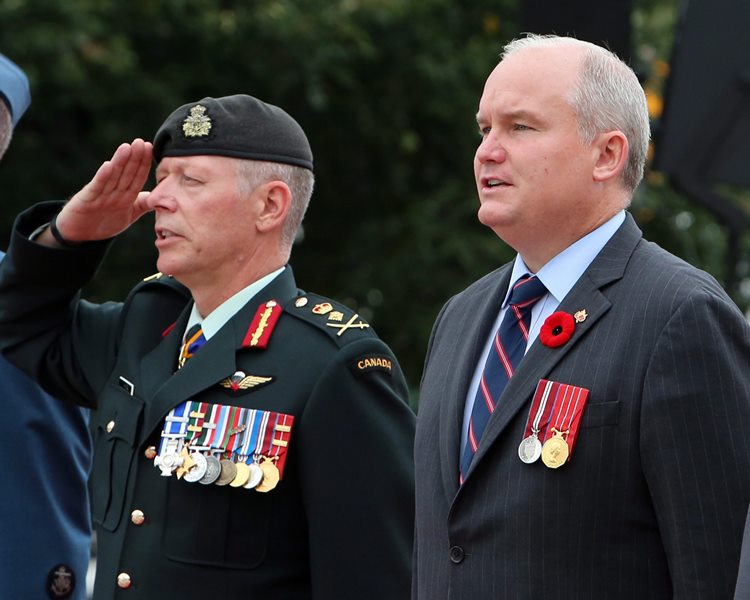OTTAWA – That everything old is new again may be the best way to describe the coming battle over sexual misconduct in the Canadian military.

The country’s defence chief has formally signed orders intended to stamp out impropriety and harassment, but to understand the kind of uphill struggle facing Gen. Jonathan Vance, just look back to 1999.
READ MORE: New chief of defence staff takes charge of military in Ottawa
“To attract and retain this highly skilled pool of personnel, they must know that they will be treated fairly, and with dignity and respect throughout their careers,” wrote now-retired general Maurice Baril, who much like Vance today, was laying out his expectations for gender equality as women were introduced to combat jobs.
He said women had a right to a harassment-free workplace and fair and equitable employment practices.
Fifteen years ago, Baril asked soldiers to respect one another. Vance is now demanding it and threatening consequences.
Last spring, a blistering report by retired Supreme Court justice Marie Deschamps found sexual misconduct was “endemic” in the military, where leaders tolerated a pervasive macho culture and women were afraid to report harassment and even assaults.
READ MORE: New RCAF commander fires warning shot, pledges no tolerance on sex harassment
- Life in the forest: How Stanley Park’s longest resident survived a changing landscape
- Bird flu risk to humans an ‘enormous concern,’ WHO says. Here’s what to know
- Roll Up To Win? Tim Hortons says $55K boat win email was ‘human error’
- Election interference worse than government admits, rights coalition says
Vance’s order not only prohibits obvious offences, but goes beyond to target behaviours that “perpetuate stereotypes and modes of thinking that devalue members on the basis of their sex, sexuality, or sexual orientation.”
Inappropriate jokes of a sexual nature, racy photos and unwelcome advances are among specifically prohibited acts.
During his swearing-in last month, the new defence chief made a point of saying that bullies are not welcome within the ranks and are often the least effective members in combat.
Yet, the attitudes that have sustained harassment are deeply entrenched and were identified a decade and half ago as major obstacles to the integration of women into combat posts.
“Women must cope simultaneously with symbols and behaviours which perpetuate and maintain male ideology while developing identities as women which satisfies the organizational culture,” said a Dec. 20, 1999 employment equity plan.
“The male identity of the organization is strongly evident through sexualized behaviours and norms, such as male attitudes of paternalism, sexist male talk, joking and innuendo and sexual harassment, in the day-to-day work environment.”
READ MORE: Canada’s military chief apologizes for ‘biological’ wiring remark on sexual misconduct
The new order by Vance tells commanding officers to act quickly when they hear of a complaint and warns that all leaders are accountable for failures that let the current culture continue.
The blunt instructions not only lay out expectations in terms of behaviour, but set timelines for action, including a rare meeting planned this week involving senior leadership from across the country where Vance is expected to lay down the law.
The onus will also be on members who believe they’ve been victimized to step forward, something that’s expected to lead to a surge in complaints and possibly military police investigations.
“Eliminating harmful and inappropriate sexual behaviour within the CAF depends on its members demonstrating the integrity to act in a manner that bears the closest scrutiny and the courage to overcome difficult challenges through determination and strength of character,” said the order. “There shall be no grace period for the application of our values and ethics. Proper conduct starts now.”
Yet, it is not the first time the military has been here.
In the late 1990s senior leadership struggled to understand why women, who had fought to become frontline soldiers, tank drivers, fighter pilots and submariners, were ditching their uniforms in unacceptably high numbers.
The report concluded that career management, social and family issues drove the departures, but the notion of a sexualized culture was never far from the surface.
“Although organizational policies and regulations are evolving in attempts to integrate women, the experience of women as ‘women within a male-dominated organization’ contributes significantly to the attrition of women from that environment,” said the employment equity review.



Comments